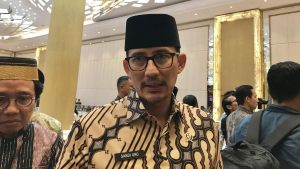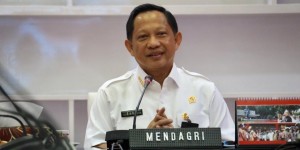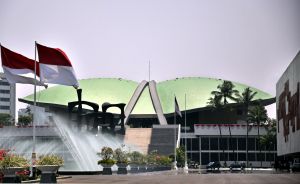Aceh protests transfer of disputed islands to North Sumatra
The Ministry of Home Affairs has sparked controversy following a recent decision to reclassify four disputed islands, Mangkir Besar (also known as Mangkir Gadang), Mangkir Kecil (Mangkir Ketek), Lipan, and Panjang, from Aceh province to North Sumatra.
The decision, formalized under Ministerial Decree No. 300.2.2-2138/2025, dated April 25, 2025, states that the islands, previously under the administration of Aceh Singkil Regency, now officially fall under the jurisdiction of Central Tapanuli Regency, North Sumatra.
Home Affairs Minister Tito Karnavian said the decision was made upon thorough inter-agency geographical assessments involving the Geospatial Information Agency (BIG), the Ministry of Marine Affairs and Fisheries, the Indonesian Navy's Hydrography and Oceanography Center, and others.
“We understand there are parties that may disagree. Legal options such as administrative court challenges are available, and we welcome those,” Tito told reporters on Tuesday, June 10, 2025.
However, the move has been met with strong resistance from the Aceh government and public, who argue that the islands have long-standing historical and cultural ties to Aceh.
On the other hand, Aceh Governor Muzakir Manaf, popularly known as Mualem, expressed deep disappointment with the decision, asserting Aceh’s legitimate claim over the four islands.
“We have strong reasons, clear historical evidence, and official data proving these islands have always belonged to Aceh,” he said during International Conference on Infrastructure (ICI) held at the Jakarta International Convention Center (JICC) on Thursday, June 12, 2025.
Local residents and traditional landowners have also protested, stating that the islands, though geographically closer to North Sumatra, have for generations been inhabited, cultivated, and managed by Acehnese communities.
Oil and gas interests
Civil society groups in Aceh have raised concerns that the reclassification may be tied to the Singkil Offshore Working Area (OSWA), an oil and gas block located near the disputed islands. The block, operated by Conrad Energy, is believed to contain significant reserves of hydrocarbons.
“There’s a growing suspicion this is not just about administration, but about control over natural resources,” Nasir, a journalist from Serambi Aceh daily told Indonesia Business Post on Friday, June 13, 2025.
UK Energy Company, Conrad Energy Asia Ltd., is currently in the exploration phase in the offshore area near the disputed islands. The classification of the islands' administrative region is significant because it determines the distribution of Oil and Gas Revenue Sharing Funds.
If the area is officially part of North Sumatra, the central government will receive 85 percent of the revenue under the cost recovery scheme, while only 15 percent will be allocated to the provincial government.
In contrast, if the area remains under Aceh’s jurisdiction, the revenue-sharing follows a different formula established under the Helsinki MoU: 70 percent of the oil and gas revenue goes to the Aceh provincial government, and only 30 percent is retained by the central government.
Nasir cited the decision has sparked widespread backlash in Aceh, with protests erupting across Aceh Singkil and the provincial capital. Many see the decision as a unilateral move by Jakarta that undermines Aceh’s autonomy and historical identity.
Local leaders and advocacy groups are calling on the provincial government to file a lawsuit at the State Administrative Court (PTUN) and explore all available legal remedies.
“This is not just a matter of land. It’s about identity, sovereignty, and respect for Aceh’s historical rights,” Nasir said.
Dispute since 1928
According to the Home Affairs Ministry, the territorial dispute dates back to the Dutch colonial era in 1928. While both provinces have historically claimed the islands, a verification process by the National Team for Topographic Naming in 2008–2009 formed the technical basis for the current decision.
At that time, Aceh reported 260 islands, excluding the four disputed ones. Later, Aceh submitted a revised list, renaming the islands and adjusting their coordinates. In parallel, North Sumatra verified 213 islands, including the four in question, which were subsequently recognized in official submissions to the United Nations in 2012.
Director General of Regional Administration of Ministry, Safrizal Zakaria Ali, said these steps formed the legal foundation for the ministerial decree.
“Both the 2009 confirmation letters from the governors of Aceh and North Sumatra, and Indonesia’s 2012 UN submission, affirm that these islands are part of North Sumatra’s administrative territory,” he said as quoted by Antara, on Wednesday, June 11, 2025.
While the government maintains the decision is final, it has indicated openness to further dialogue or legal adjudication.
For now, the future of the four islands remains contested reflecting deeper tensions between local identities, natural resource governance, and national territorial management.
Already have an account? Sign In
-
Start reading
Freemium
-
Monthly Subscription
20% OFF$29.75
$37.19/MonthCancel anytime
This offer is open to all new subscribers!
Subscribe now -
Yearly Subscription
33% OFF$228.13
$340.5/YearCancel anytime
This offer is open to all new subscribers!
Subscribe now






